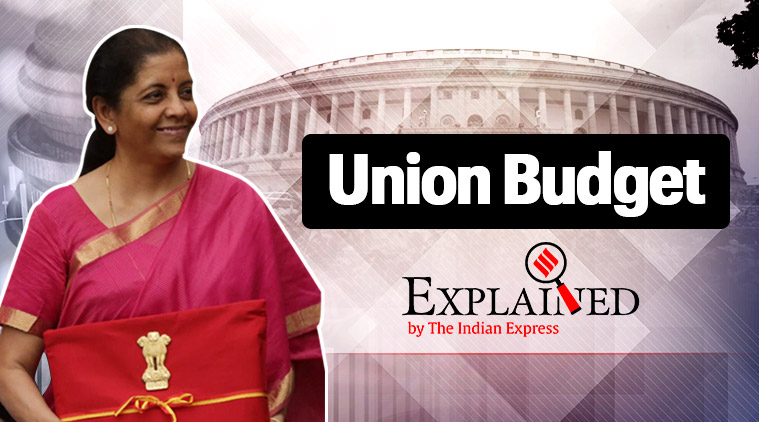Budget 2019 Explained: Lower corporate tax will boost profits of a large swathe of companies
Budget 2019 Explained: An explanation and analysis of the Budget presented by Finance Minister Nirmala Sitharaman in Parliament Friday.
 Union Budget 2019 Explained: The Union Budget was presented by Finance Minister Nirmala Sitharaman in Parliament on Friday.
Union Budget 2019 Explained: The Union Budget was presented by Finance Minister Nirmala Sitharaman in Parliament on Friday.
Union Budget 2019 Explained: Finance Minister Nirmala Sitharaman Friday presented her maiden Union Budget in Parliament. Here are some of the announcements made in the first Budget of the Prime Minister Narendra Modi 2.0 government, and what it means.
Budget Explained: 25% tax for companies with turnover of over Rs 400 crore
The government has proposed lower corporate tax of 25 per cent now widened to companies with an annual turnover of Rs. 400 crore. This will boost the profits of a large swathe of companies — 99.3 per cent of corporate India.
Companies with turnover of upto Rs 400 crore to be taxed only 25%. Earlier, companies with upto Rs 250 crore turnover were taxed at this lower rate of 25% #Budget @IndianExpress
— P Vaidyanathan Iyer (@iyervaidy) July 5, 2019
No tax scrutiny on valuation and e verification for startups: This should help remove uncertainty and ease burden and boost startups.
Budget Explained: Disinvestment of Air India
The challenge with strategic disinvestment of Air India and a few more PSUs is in attracting investors given the debt burden of many of these firms. It will depend on write-offs of loans or sweeteners. The government has also proposed increasing the disinvestment target to Rs 1,05,000 crore in FY20 as against Rs 90,000 crore set in the interim budget.
Budget Explained: Investment in govt bonds for foreign portfolio
Higher investment in government bonds for foreign portfolio investors should see more flows into the domestic market, ease pressure on interest rates and on bond yields and help the Rupee strengthen. But, the downside risk is outflows in a crisis and the resultant pressure on Rupee and the current account deficit.
Rs 100 crore infra spending — Where are the funds?
The government has proposed Rs 100 crore infrastructure spending over five years. The big challenge will be to raise funds for this. However, this may see the emergence of development finance institutions again to channelise long term funds after a long time.
Budget Explained: Credit to PSBs for purchase of NBFCs
The government has proposed to provide one-time credit enhancement to PSU banks for six months for the purchase of highly pooled assets of sound NBFCs. This will ease liquidity burden of NBFCs with flow of funds from banks and help them lend again.
Budget Explained: RBI to get regulation authority of housing finance sector
Regulatory oversight over NBFCs and housing finance companies for the RBI should see more financial discipline in this sector and perhaps a shakeout.
Budget Explained: Rs 70,000 crore capital infusion in PSBs
The government has proposed a Rs 70,000 crore capital infusion into government-owned banks this year. With the bad loan cycle almost bottoming out according to the Reserve Bank of India, this should help banks to lend more this fiscal.
Budget Explained: Measures for aircraft financing
Measures for aircraft financing in India should ease the forex burden for Indian aviation companies or airlines who have to pay overseas financiers in a sector which is growing rapidly
Budget Explained: Streamlining labour laws
Streamlining labour laws and setting up labour courts: This depends on changes in the Industrial Disputes Act and how states implement these laws. Faster resolution of labour disputes should provide comfort to industry and entrepreneurs.
Budget Explained: Incentives for electric vehicles
The government has allocated Rs 10,000 crore for faster adoption of electric vehicles and has announced upfront incentives for electric vehicles. This will help attract investment for manufacture and ensure clean energy over time.
Budget Explained: PSUS for housing
Land parcels of PSUS to be developed for housing: This will free land, boost housing with its multiplier effect on other industries and help government raise additional resources.
Budget Explained: Public holding of listed companies up to 35%
Increasing public holding of listed companies from 25 to 35 per cent: This will help ensure more floating stock and liquidity.
Sebi asked to consider raising public shareholding in companies to 35% from 25% #Budget 2019-20 @IndianExpress
— P Vaidyanathan Iyer (@iyervaidy) July 5, 2019
Social exchange platform to be set up: This will help social enterprises and voluntary organisations to raise public funds
Simplified KYC norms for FIIs and FPIs: This will remove an impediment to easier flows to India’s capital markets
Budget Explained: FDI in Aviation, Insurance and Media
The government has proposed more Foreign Direct Investment in Aviation, Insurance and Media. Both the Aviation and Insurance sectors which need capital could attract inflows with greater control for overseas partners.
Long term corporate bond market development measures: Allowing AA Rated bonds as collateral should help first raise more funds and ease pressure on banks.
Credit guarentee and investment corporation of India to be set up: This should help banks in terms of additional cushion while looking at lending and support companies and trying to raise funds.



- 01
- 02
- 03
- 04
- 05


































